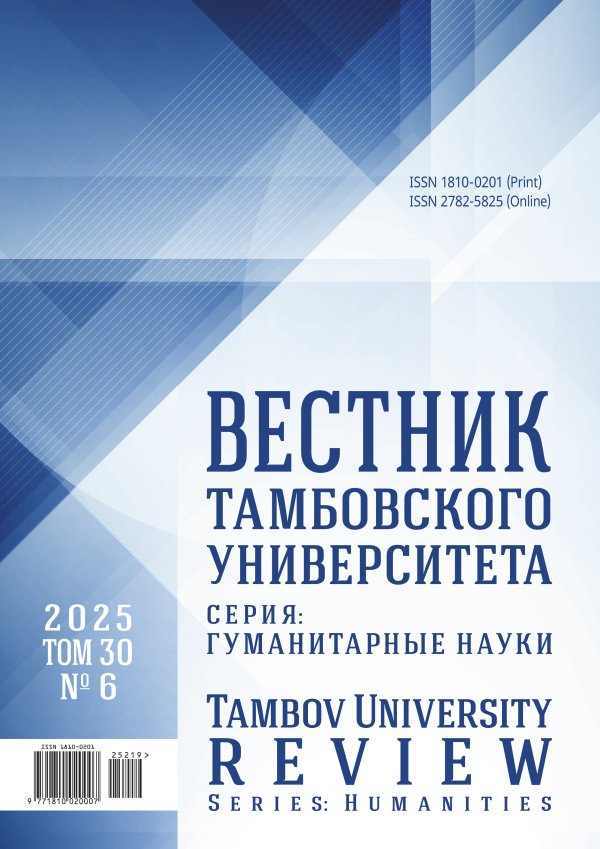Военно-техническое сотрудничество между Россией и Республикой Корея в 1994-2005 гг.
- Авторы: Малолетко А.В.1
-
Учреждения:
- Московский государственный институт (университет) международных отношений МИД России
- Выпуск: Том 29, № 6 (2024)
- Страницы: 1830-1840
- Раздел: ИСТОРИЯ ЗАРУБЕЖНЫХ СТРАН
- URL: https://bakhtiniada.ru/1810-0201/article/view/297551
- DOI: https://doi.org/10.20310/1810-0201-2024-29-6-1830-1840
- ID: 297551
Цитировать
Полный текст
Аннотация
Актуальность. Цель исследования – рассмотреть значимые аспекты военно-технического сотрудничества между Россией и Республикой Корея, осуществлявшегося в рамках проекта «Бурый медведь» в 1994–2005 гг. Интерес представляет анализ специфики кооперации в указанном сегменте между странами, до начала 1990-х гг. являвшимися идеологическими противниками.
Материалы и методы. Привлечены исследования российских и южнокорейских ученых, в которых рассматривались факторы, воздействовавшие на динамику военно-технических связей между Москвой и Сеулом. Наряду с общенаучными методами, такими как системный исторический анализ, использовались историко-ретроспективный, аксиологический методы и SWOT-анализ (анализ сильных и слабых сторон, возможностей и угроз).
Результаты исследования. Выяснено, что расчеты Москвы на продвижение российских вооружений в Южную Корею, а также заинтересованность Сеула в получении российской современной военной технологии формировали позитивные ожидания. Вместе с тем выделен комплекс факторов, не позволивших создать существенные заделы на будущее по итогам двух этапов проекта «Бурый медведь».
Выводы. Военно-техническое сотрудничество с Сеулом стало для Москвы важным опытом такой деятельности на азиатском направлении, уникальность которой была обусловлена, в том числе, южнокорейским статусом стратегического союзника США
Об авторах
А. В. Малолетко
Московский государственный институт (университет) международных отношений МИД России
Автор, ответственный за переписку.
Email: al2628319@gmail.com
ORCID iD: 0009-0005-5995-6474
Малолетко Алексей Владимирович, научный сотрудник исследовательской лаборатории «Центр японских, корейских и монгольских исследований», помощник проректора ректората
Россия, 119454, Российская Федерация, г. Москва, просп. Вернадского, 76Список литературы
- Торкунов А.В., Стрельцов Д.В., Колдунова Е.В. Российский поворот на Восток: достижения, проблемы и перспективы // Полис. Политические исследования. 2020. № 5. С. 8-21. https://doi.org/10.17976/jpps/2020.05.02, https://elibrary.ru/dbkkfu
- Курбанов С.О. «Договор об основах отношений Российской Федерации и Республики Корея» от 19 нояб-ря 1992 г. и его значение для развития российско-южнокорейских отношений // Вестник Центра корей-ского языка и культуры. 2016. № 17. С. 104-106. https://elibrary.ru/wjydfb
- Kwak Tae-Hwan, Joo Seung-Ho. Military cooperation between Russia and South Korea // International Journal of Korean Unification Studies. 1999. Vol. 8. Р. 147-177.
- Keum Giho: Pangwisaeopcheong konggunjungryeong. «Han・Ro gunsagisulhyeopryeok phiryoseong kochal». Jae 10 cha HanRo kukpanghaksulhoeui jaryojip (Кым Гихо. Корейская администрация программ оборонных закупок // Изучение важности южнокорейско-российского военно-технического сотруд-ничества: докл. для 10 Корейско-Российской науч. конф. по вопросам национальной обороны. Сеул: Korean Institute for Defense Analysis, 2010. C. 151-168.)
- Ahn Se Hyun. Policing Northeast Asia. The Politics of Security in Russia and Korea. Singapore: Palgrave Macmillan, 2020. 319 р. https://doi.org/10.1007/978-981-15-5116-1, https://elibrary.ru/isnlpj
- Санжиев А.А. Военно-техническое сотрудничество России и Республики Корея // Мировая экономика и международные отношения. 2005. № 8. C. 52-54. https://elibrary.ru/hscjzx
- Торкунов А.В. По дороге в будущее. М.: Аспект Пресс, 2017. 648 с. https://elibrary.ru/ypkfrj
- Yoo Yeongcheol. «Han・Ro kunsahyeopryeok 20 junyeonphyeonka mit jeongmang». Jae 10 cha HanRo kukpanghaksulhoeui jaryojip. (Ю Ёнчхоль. Оценка и перспективы 20 лет корейско-российского военного сотрудничества: сб. докл. для 10 Корейско-Российской науч. конф. по вопросам национальной обороны. Сеул: Korean Institute for Defense Analysis, 2010. С. 87-105.)
- Чиков В.М. Состояние и перспективы развития Россудостроения // Судостроение. 2003. № 2. С. 54-57. https://elibrary.ru/hvghpx
- Безик И.В. Десантные катера «Мурена» для Южной Кореи // Россия и АТР. 2005. № 3. С. 151-154. https://elibrary.ru/pluxwx
- Ahn Se Hyun. Understanding Russian – South Korean Arms Trade. A Nontraditional Security Approach? // Armed Forces & Society. 2009. № 35 (3). Р. 421-436.
- Ом Гухо. Переговорный процесс по установлению дипломатических отношений между РК и СССР и его историческое значение // Российско-корейские отношения в формате параллельной истории. М., ООО Изд-во «Аспект Пресс», 2022. С. 499-563. https://elibrary.ru/cufsqz
- Дьячков И.В. Российско-южнокорейские политические связи: 30 лет спустя // Корейский полуостров: история и современность. М.: Изд-во Ин-та Китая и современной Азии РАН, 2020. С. 44-55. https://elibrary.ru/kwirct
- Sergounin A.A., Subbotin S.V. Russian arms transfers to East Asia in the 1990s. N. Y.: Oxford University Press, 1999. 146 p.
Дополнительные файлы









